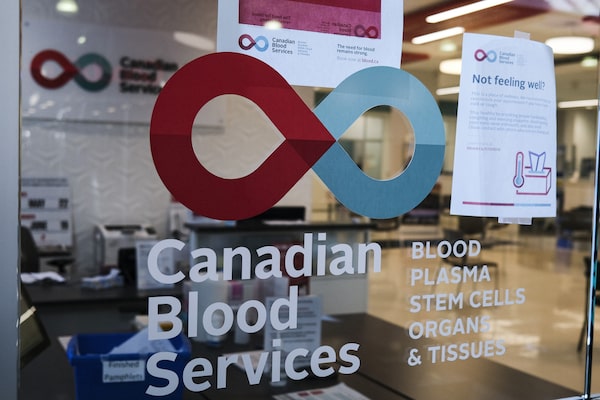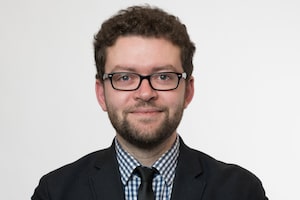
Canadian Blood Services said earlier in August 2022 that it is looking to work with private, for-profit firms that pay donors as part of a goal to collect half of its supply of blood plasma from Canadian donors.Jeff McIntosh/The Canadian Press
Quebec’s blood-collection agency says its plan to expand plasma collection in the province is working and it has no need to follow the national agency in partnering with private companies.
Canadian Blood Services said earlier this month that it is looking to work with private, for-profit firms that pay donors as part of a goal to collect half of its supply of blood plasma from Canadian donors. CBS currently buys about 85 per cent of its plasma from the global market, much of which comes from places where donors are paid.
Plasma is a protein-rich liquid found in blood that is used for transfusions and is a key ingredient in some medicines, including immunoglobulin.
Private plasma company says Canadian Blood Services plan could open up collection ban in Ontario
Laurent Paul Ménard, a spokesperson for Héma-Québec, which manages the collection and supply of blood in Quebec, said his agency once faced the same supply challenges as CBS. Quebec law currently prohibits paying for plasma, so CBS’ strategy would not apply to Héma-Québec. But Mr. Ménard said the agency has no intention of trying to see the law changed and it has tackled the problem differently.
Héma-Québec has built four new plasma collection centres in the last decade, with another one under construction, and upgraded six blood-donation centres so that they could also take plasma. (The process for donating plasma is longer and requires different equipment from donating blood.) Each facility cost between $2-million and $3.7-million to build. The agency said it did not receive special funding from the federal or provincial governments, but did get help from municipalities in some cases.
Mr. Ménard said voluntary donations have soared as a result of having more locations to donate.
He said that when this plan was first implemented in 2013, Héma-Québec could only collect about 15 per cent of the plasma it needed. But thanks to the new centres, that figure rose to 30 per cent last year and is on track to reach its ultimate goal of 42 per cent.
“This strategy has allowed us to double our self-sufficiency rate,” Mr. Ménard said.
CBS has not been as successful with its expansion plan. In 2017, the national agency requested a total of $855-million from provinces other than Quebec to build a network of 40 new plasma-collection centres so it could reach 50-per-cent self-sufficiency, up from its current rate of 15 per cent.
The provinces ended up providing some money, but not as much as requested. (CBS declined to give an exact amount.) The agency has opened five of a planned 11 new centres across the country, which it hopes will provide up to 25-per-cent self-sufficiency.
CBS is now in talks with pharmaceutical firms, which pay donors, to help it collect more plasma in Canada. “To be clear, we are not selling off or privatizing any part of our business,” CBS said in a statement last week.
Paid plasma donation is banned in Quebec, B.C. and Ontario.
The bans on paying for plasma in B.C. and Ontario contain exemptions that allow CBS, or its agents, to operate in those provinces. Industry figures say working with CBS will allow private firms to circumvent the bans, opening up new markets for them.
Quebec’s ban is different, however, as it is part of a prohibition in the province’s Civil Code on paying for any human body part. There are no exemptions.
The Canadian Hemophilia Society is one of many patient groups that says it supports CBS’s move to work with private firms, as it considers partnership a safe way to increase the overall supply of plasma. (Like other patient groups, CHS receives some of its funding from pharmaceutical companies, though not from any private plasma companies operating in Canada.)
Health Canada and CBS have said that research shows plasma from paid donors is just as safe as plasma from unpaid donors.
David Page, national director of health policy at the Canadian Hemophilia Society and chair of Héma-Quebéc’s safety advisory committee, said he suggested to Héma-Québec’s leadership that the ban on paying for plasma should be lifted. Then both types of collection centres – those that compensate and those that don’t – can operate and maximize donations.
“You need more of both kinds,” said Mr. Page.
When asked if the Quebec government might consider revisiting the ban, a spokesperson for Quebec’s health ministry directed questions to Héma-Québec.
Mr. Ménard said Héma-Québec currently has no plans to recommend opening up the paid-plasma ban, as the current collection strategy appears to be working.
Our Morning Update and Evening Update newsletters are written by Globe editors, giving you a concise summary of the day’s most important headlines. Sign up today.
 Chris Hannay
Chris Hannay